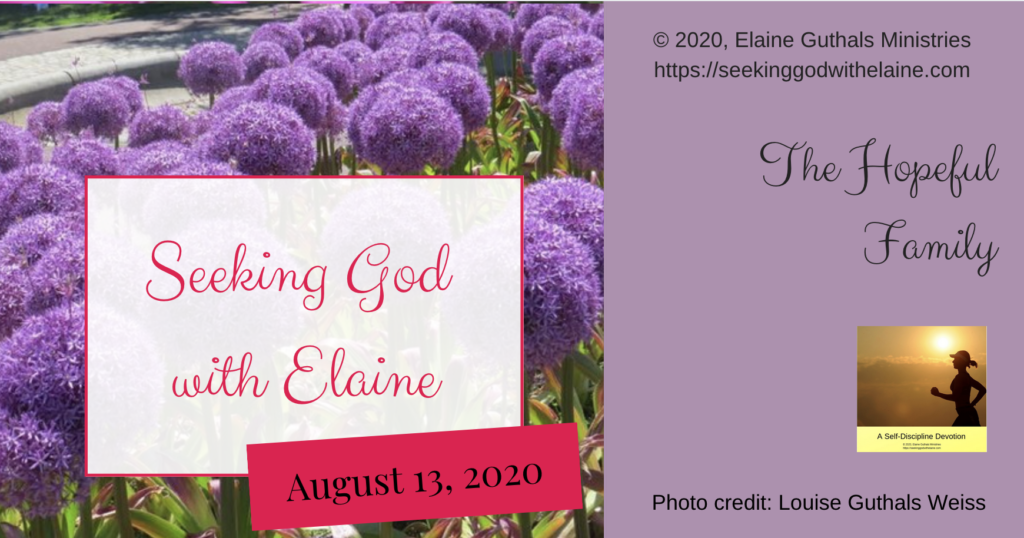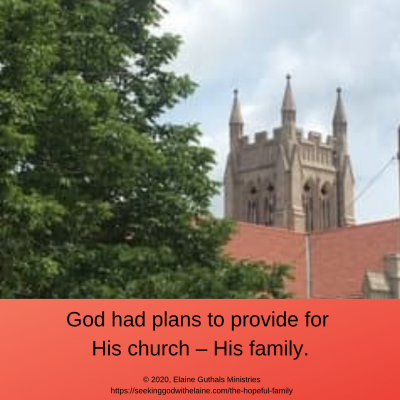Infertility is difficult for couples who are wanting to start or expand their family. There is a story in the Scriptures that show how Hannah approached her infertility. This devotion looks at how she placed her faith and trust in God to hold on to the hope that God would give her a child.
Nuggets
- Hannah’s deep hurt came out in tears and pleading with God.
- God will always let us come to Him when we are hurting and upset.
- It is sinful to want something that is not in God’s plan for us, but it is not sinful to long for His plan to be fulfilled in us.
In Support of Widows
Instructing Our Children
Who Is the Greatest in the Kingdom of Heaven?

Let's Put It into Context #1
Family is, according to the Holman Bible Dictionary, “the basic household unit which provides a person’s central relationships, nurture, and support.”
Resource
Ordinances are an expression of the disciples’ obedience. Marriage is an ordinance.
Let's Put It into Context #2
“There was a man from Ramathaim-zophim in the hill country of Ephraim. His name was Elkanah son of Jeroham, son of Elihu, son of Tohu, son of Zuph, an Ephraimite. He had two wives, the first named Hannah and the second Peninnah. Peninnah had children, but Hannah was childless” (I Sam. 1: 1-2 CSB)
It was called polygamy. That is where a spouse has more than one spouse – at the same time. It could be that I would have two husbands, but usually in the Scriptures, it was the husband having a couple of wives.
God did make provision for it. “If he takes another wife to himself, he shall not diminish her food, her clothing, or her marital rights” (Ex. 12: 10 ESV). That reads to me that God did not make it unlawful to take more than one wife – the husband couldn’t stop providing for her if he did.
We know God wanted marriage to be honored. “Let marriage be held in honor among all, and let the marriage bed be undefiled, for God will judge the sexually immoral and adulterous” (Heb. 13: 4 ESV). He wanted a harmonious family.
That didn’t seem like it happened in most of the cases in the Scriptures where there was more than one wife. Abraham didn’t have good luck with that, and neither did Jacob. David even had his issues.
It didn’t seem that it worked out for Elkanah, either. Hannah may have been Wife #1, but when Peninneh started having kids, someone who shall be nameless, but her initials are Peninneh started being a bully.
Let's Put It into Context #3
We’ve been equating the family to the church in this series. It works here, too.
The family structure had its issues. So did the church.
Guthrie explained what was happening. He wrote, “Outraged and disgraced by the crimes of its ministers, religion sank into public contempt, and, almost mortally “wounded in the house of its friends,” seemed ready to expire. At first indignant, and in the end demoralized (sic), the people deserted the house of God. and abandoned the profession of a religion which the crimes of its priests had made to stink in their nostrils.”
It was bad.
Resource
Deals for What We Want
“Deeply hurt, Hannah prayed to the Lord and wept with many tears. Making a vow, she pleaded, “Lord of Armies, if you will take notice of your servant’s affliction, remember and not forget me, and give your servant a son, I will give him to the Lord all the days of his life, and his hair will never be cut’” (I Sam. 1: 10-11 CSB)
We talked about how God’s first blessing got a little hairier after the judgment.
- “God blessed them, and God said to them, ‘Be fruitful, multiply, fill the earth, and subdue it. Rule the fish of the sea, the birds of the sky, and every creature that crawls on the earth’” (Gen. 1: 28 CSB).
- “He said to the woman: I will intensify your labor pains; you will bear children with painful effort. Your desire will be for your husband, yet he will rule over you” (Gen. 3: 16 CSB).
Instead of children being a blessing, childlessness was looked on as being blessed. Whyte wrote, “Till it came to be nothing short of a mark of a special election, and a high calling, and a great coming service of God in Israel to have no children.” Oh, yeah. That sounds worldview, doesn’t it?
Resource
Hankinson contradicted Whyte. He argued, “The desire of Jewish women to be the mothers of families was connected with religious feeling: children were regarded as a blessing from the Lord, and the withholding of them was considered a token of the Divine displeasure.” I lean more this way.
Resource
Brooke argued that motherhood completes a woman’s nature. At least for Hannah – maybe not for all – this seems to be the case. Hannah was “deeply hurt …” (I Sam. 1: 10 CSB).
Resource
Hannah’s deep hurt came out in tears and pleading with God. Still, Hannah approached God with hope. We learn a couple of things from Hannah’s short prayer.
“Lord of Armies …” (I Sam. 1: 11 CSB)
Hannah recognized that the final decision rested with God as to whether she was going to be a mother or not. No fertility pills or treatments were going to get her pregnant. Only God could do that.
All of Hannah’s actions show she wanted to do God’s Will. She and her family came annually to worship. “This man would go up from his town every year to worship and to sacrifice to the Lord of Armies at Shiloh, where Eli’s two sons, Hophni and Phinehas, were the Lord’s priests” (I Sam. 1: 3 CSB). So, Hannah and Elkanah were both God-fearing people.
To chase a rabbit a second, it was obvious what Elkanah’s feelings were toward Hannah. Even though he may have – probably – taken Peninneh as a wife because no kids were coming, he still was cognizant of Hannah’s feelings.
“‘Hannah, why are you crying?’ her husband, Elkanah, would ask. ‘Why won’t you eat? Why are you troubled? Am I not better to you than ten sons?’” (I Sam. 1: 8 CSB).
Guthrie described Elkanah’s words this way. He wrote, “In what esteem Elkanah held her, how fondly he cherished her, and how kind he was to her, appears in the very strong and tender terms with which he essays to soothe her grief …”
Resource
Elkanah’s actions also backed up his words of love. He would always give Hannah a double portion of the sacrificial meat (I Sam. 1: 5). Her being childless did not alter his feelings toward her.
“… if you will take notice of your servant’s affliction, remember and not forget me, and give your servant a son …” (I Sam. 1: 11 CSB)
Since God is Lord of Armies, Hannah approached Him as being His lowly servant with hope. She knew He was probably more concerned with whatever war was raging at the time – physical or spiritual. But she knew He was still concerned with her and her affliction.
God will always let us come to Him when we are hurting and upset. He can stand the tears. He is big enough to be asked why. When we are bullied or feel like we have been dealt an unfair hand, God lets us question.
As long as we question in faith. As long as we acknowledge He is Lord of Armies.
Our attitude has to be right. We have to approach Him as Sovereign God.
“… I will give him to the Lord all the days of his life, and his hair will never be cut” (I Sam. 1: 11 CSB)
I don’t think we talk God into giving us a spouse or a child. I don’t think we make deals to get what we want.
He has a plan already designed based on the decisions He knows we will make. Remember, He is omniscience.
To read a related devotion, click the button below.
I think we convince Him we are where He wants us to be to have a spouse or a child. It all has to be in His Will.
Hannah didn’t just pour her sorrow out on God and expect Him to immediately answer it. She kept worshiping Him. She got up the next morning with praise on her lips.

Honoring Her Vow
“‘Please, my lord,’ she said, ‘as surely as you live, my lord, I am the woman who stood here beside you praying to the Lord. I prayed for this boy, and since the Lord gave me what I asked him for, I now give the boy to the Lord. For as long as he lives, he is given to the Lord.’ Then he worshiped the Lord there’” (I Sam. 1: 26-28 CSB)
In time (and we don’t know how much time), Samuel was born. Hannah acknowledged that he was a gift from God.
It is sinful to want something that is not in God’s plan for us. It is not sinful to long for His plan to be fulfilled in us.
When I was growing up, I thought it was so sad that Hannah had to give up the baby for whom she had cried so passionately. God used her obedience.
Oh, to be a fly on the wall when Hannah went back to Eli with Samuel in tow. “Hey, remember me? I was the lady you thought was drunk (I Sam. 1: 13). Nope, I got a kid instead of a hangover. He’s yours now.”
Hannah’s prayer came full circle. She prayed asking for a son and promised specific action on her part. God provided the son. Hannah acted.
Nowhere in these verses do we see where Hannah tried to get out of her vow. Yes, “… Hannah stayed there and nursed her son until she weaned him” (I Sam. 1: 23 CSB).
Hannah knew that the first three years, Samuel needed to learn how to be a human. He needed to learn to walk, talk, eat, dress himself, etc.
After he had learned the basics, Samuel could go to Eli and learn what God had in store for Him.
We know the rest of the story. We know who Samuel grew up to be. Israel was much blessed because they had the Prophet Samuel leading them. Samuel is one of the Hall of Famers.
God had plans to provide for His church – His family. He used Hannah’s request to work things out for both of their good.

Making the Connections
Why does God not give children to those who want and are well-suited for motherhood when He gives them to those who definitely aren’t and shouldn’t be? I don’t know. That is above my paygrade.
What I do know is God knows why. It isn’t to hurt us. We know that “… God causes everything to work together for the good of those who love God and are called according to his purpose for them” (Rom. 8: 38 NLT).
I know He has a reason – a good reason.
Meyer made a good point. Yes, Hannah was approaching God in the right way, as we discussed. But she was also approaching Him with the attitude that a prayer for a kid was something easy for Him to fulfill.
Resource
Hannah didn’t doubt at all. She wasn’t wishy-washy about what she wanted and what she would do when God fulfilled the prayer. Oh, there was no doubt but that He was going to fulfill the prayer.
This story is further proof that God wants to be the God of the big things as well as God of the little things. He wants us to feel comfortable to come to Him with anything that is making us sorrowful.
Making the Connections to Self-Discipline
This story could bring up several questions with which non-believers would struggle. We touched on the infertility issue. They also may question why God would accept Hannah’s vow of giving Samuel to God, especially if we are to go forth and multiply – and God wasn’t keeping up His end of that.
We’ve been looking at defending our beliefs when we are witnessing. That means we have to be secure enough to convince someone to accept our beliefs.
Our questions should still serve us to determine on what we need to focus.
- What does the Scriptures say?
- What do I believe?
- Why do I believe the same/differently than the Scriptures?
- What are the talking points when witnessing to a non-believer?
Related Links
I have created a worksheet of the questions above. Click on the button below to access it.
How Do We Apply This?
Oh, that we would have Hannah’s prayer life! We need her comfort in approaching Sovereign God. We need to have her faith that our prayers will be answered. May we be as devout disciple as she was.
We barely touched on the fact that Hannah’s prayer was short. She didn’t need a long prayer, because her relationship with God was right. She could give the short prayer then.
Obviously, Eli saw Hannah praying. However, he didn’t hear her prayer. That was just between her and God. We need to keep our prayers private also.
God is going to provide for His people. That is the hope that we have. We have that hope in Him.
Father, You love us and provide for us. You answer our prayers when we pray in Your Will. May we always look for Your Will rather than our own. Amen.
What do you think?
Leave me a comment below (about this or anything else) or head over to my Facebook group for some interactive discussion.
If you don’t understand something and would like further clarification, please contact me.
If you have not signed up for the email daily or weekly providing the link to the devotions and the newsletter, do so below.
If God has used this devotion to speak with you, consider sharing it on social media.
Pingback: In Support of Widows – Seeking God with Elaine
Pingback: Attributes of God: Holy – Seeking God with Elaine